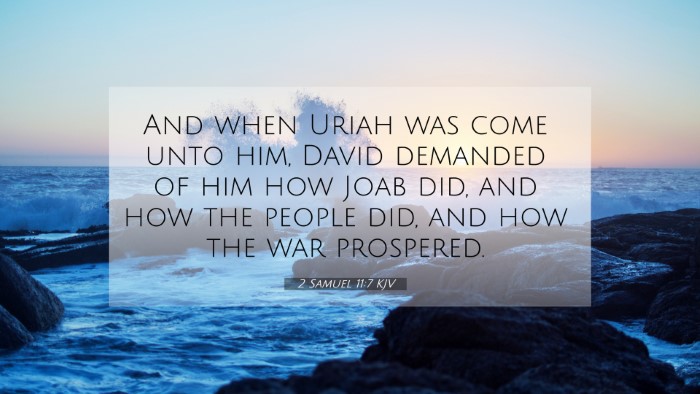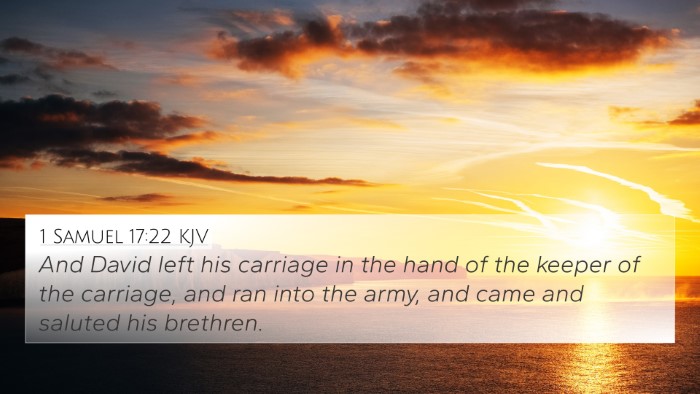Analysis of 2 Samuel 11:7
The Bible verse 2 Samuel 11:7 states: "And when Uriah was come unto him, David demanded of him how Joab did, and how the people did, and how the war prospered." This verse appears within a significant narrative in the life of King David, highlighting both his leadership and the personal moral failures that come to define his reign.
In understanding this verse, it is essential to consider the context surrounding it. David, while taking a stroll on his roof, had seen Bathsheba and subsequently summoned her, leading to a grave sin (2 Samuel 11:2-5). Attempting to cover up his transgression, David calls Uriah, Bathsheba’s husband, back from battle to report on the state of the war.
Commentary Insights
- Matthew Henry: Henry comments on David's inquiry into the war as a facade for his ulterior motives. He portrays David as trying to play the part of a concerned leader while masking his guilt. It reflects the deceit that can arise from sin and the lengths to which one may go to cover it up.
- Albert Barnes: Barnes highlights the contrast between Uriah’s loyalty to his king and the betrayal happening in the palace. His analysis points to Uriah’s character as honorable, which further emphasizes David's wrongdoing.
- Adam Clarke: Clarke suggests that David’s question about the war was trivial and insincere, illustrating the king’s moral decline. The inquiry serves more to distract from David’s own sins than to express genuine concern for his people or army.
Thematic Connections
This verse serves as a vital connection within the larger narrative arc found in Samuel, and explores themes such as:
- Abuse of Power: David uses his authority to manipulate and deceive in an effort to conceal his wrongdoing.
- Moral Failure: The events leading to this moment showcase how a leader can fall into grave sin, leading to a series of tragic consequences.
- Loyalty vs. Betrayal: The loyalty of Uriah starkly contrasts with the betrayal David orchestrates, serving as a profound lesson on the nature of true loyalty.
Bible Cross References
The following verses offer rich cross-references, establishing a series of connections between 2 Samuel 11:7 and other scriptures:
- 2 Samuel 11:6: The initial command to bring Uriah back, revealing David's intent.
- 2 Samuel 12:7: The prophet Nathan’s confrontation with David, exposing his sin.
- Proverbs 28:13: The principle of confession and forsaking sin to find mercy.
- Psalm 51:4: David's own acknowledgment of sin against God, reflecting on personal failure.
- 1 Chronicles 2:15: Details about Uriah as a way to honor his memory as an innocent victim.
- Matthew 1:6: The genealogy of Jesus, which includes David, linking back to this scandal.
- James 1:14-15: The process of temptation and sin that can lead to death, relevant to David's actions.
Inter-Biblical Dialogue
The connections between 2 Samuel 11:7 and these cross-references establish an inter-Biblical dialogue concerning themes of sin, repentance, and divine justice. By analyzing these verses, one can understand the ongoing moral narratives that resonate throughout scripture.
Conclusion
2 Samuel 11:7 reveals the deceptive depths to which a leader can descend when embroiled in personal sin. The verse not only serves as a cautionary tale but also illustrates the broader themes of accountability and the inevitable consequences of sin. By cross-referencing this verse, readers can gain a deeper understanding of the spiritual and moral lessons that the Bible encapsulates regarding human nature, leadership, and divine expectations.





